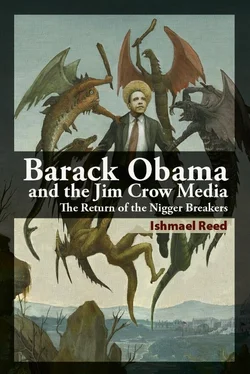The Robocall being used by McCain’s campaign was one of Atwater’s tools. Slyly disparaging your candidate by asking a series of leading questions. When McCain’s Robocalls imply that Obama and Ayers planned the bombing of the Pentagon, some of the recipients of these calls are so ignorant that they probably think of the 9/11 attack and not the 60s Weathermen activities that occurred when Obama was eight years old.
Predictably in the final weeks, code terms like “Welfare” and “Socialism” are being bellowed by McCain and Palin. These are the standard Atwater tricks. Slithering beneath McCain’s speeches is the idea that Obama is going to take the hard earnings of people like tax dodger Joe the Plumber, and give it to lazy black people who, as whites have been told by the media for decades, receive all of the Welfare, when it would take a couple of hundred years for blacks to attain the kind of subsidies and government support that whites have received. If one refers to these appeals as racist, the little Goebbelses surrounding McCain’s campaign would plead innocence, another leaf from the Atwater handbook. Only Rick Davis has expanded the technique by accusing the accusers of racism.
Among Atwater’s clients was George Bush One. So powerful is the Bush family, two of whose presidential campaigns were managed by Lee Atwater, that they were able to crush the promotion of Kitty Kelley’s devastating portrait of the Bushes, The Family , for which she received Pen Oakland’s Censorship Award.
The Bush family has even been able to wuss Hollywood. In Oliver Stone’s W , George W. Bush is portrayed as a clownish loveable and clumsy dope and reformed party boy who was misled by incompetent and sinister advisors into believing that Iraq harbored weapons of mass destruction, not someone who was bent on invading the country from the beginning of his presidency, WMDs or no WMDs.
Bush One is portrayed as a wise leader, a Solomon, despite his connection to the Iran-Contra scandal, his support of Central American death squads, the Willie Horton campaign and his invasion of Panama that cost three thousand Panamanian lives. Nothing is said in W about the slaughter in the desert of thousands of retreating Iraq soldiers on “The Highway of Death.” Lee Atwater is barely identified in this film. In his attempt to be objective, Stone chickened out.
Stefan Forbes, a young filmmaker with little money used a small HD camera, the HYX-200, edited his film, Boogie Man, The Lee Atwater Story , on a Macbook Pro laptop, the kind of brilliant use of technology that will lead to the decline of Hollywood in the same way that cyberspace is undercutting the flaccid Jim Crow corporate media where Joe Barbies and Jane Bimbos are awarded the status of journalists, and they have the temerity to ridicule the vacuity of Sarah Palin. Filmmaker Stefan Forbes, an outsider, has done what corporate Hollywood has failed to do with his Boogie Man, The Lee Atwater Story .
Forbes’s is the most courageous film about the use of Atwater’s tactics by the Republican Party and his beyond-the-grave influence on the McCain campaign, the kind of campaign that Joseph Goebbels used against Germany’s Others .
Last year a bubbling, bouncy young Stefan Forbes asked whether I would be interviewed for a documentary on Lee Atwater, the Republican idea man who raised the dirty tricks strategy to an art form. Forbes and his producer came out to the house and asked me a series of on-camera questions about Atwater, specifically his use of the fear of race mixing, the old strategy that ex-Confederate candidates for office used to stir up fears about blacks being elected to office, while these officers were doing some heavy race mixing with African women prisoners. I also gave my opinion about Atwater’s exploitation of anxieties about black men and his love for black music. Indeed in Forbes’s film, Atwater comes across as a “white negro,” a term that appears during the Civil War when a Southern newspaper accused Jefferson Davis of treating Southern whites like “white negroes.”
After the interview, Forbes and I exchanged information. I sent him some historical documents and he kept me informed about the progress of the film. Early this year, Forbes announced that his documentary, Boogie Man, The Lee Atwater Story , would be shown at the Los Angeles Film Festival. It received rave reviews.
Next I learned that it was screened at the Democratic Convention. Preparing for a trip east on September 19 for appearances at Yale, Colgate, The New School, New York University and a trip to Buffalo, New York, for my mother’s book party, I learned that Stefan’s film would be showing at the New Cinema in New York on East 12th Street.
I didn’t know what to expect. Our guests at my movie debut were my daughter, Tennessee and her friend the famed poet from Puerto Rico, Linda Rodriquez-Guglielmoni; Carla and her friends Karin Bacon, whose business is creating events all over the world — she got to talk to Michael Jackson in Dubai — and Kate Hirson, a film editor who has worked with Clint Eastwood.
People exiting from the theater recognized me and asked what I thought of it. I told them that I hadn’t seen it. I sat in a rear corner of the theater in case I had to crawl beneath my seat were my performance not up to par. The full house was riveted as Lee Atwater’s life unraveled before us. Forbes’s interviews with politicians and commentators were mixed with archival footage. But the way the archival footage was used was ingenious. Some of it seemed to do for Atwater what talk therapists do for those who use their services. Though surrounded by his fellow good old boys, even at home, some of the stills show him to be distant from the celebratory events following the success of those politicians whom he packaged. In some of the scenes he seems to be daydreaming. When a child, Atwater caused an accident in his home that killed his younger brother. His screams haunted Atwater all of his life.
Lee Atwater perfected the appeal to racist feelings among some white voters. For over a hundred years politicians ran against fears of a black uprising, from the ex-Confederate officers, who regained their power in Congress after the Civil War, through Tom Watson, a politician who began his career as a populist, through the colorful Southern demagogues of the twentieth century. Instead of using explicit language, Atwater suggested code terms. “Welfare.” “Crime.” “Busing.” In his famous quip, Jesse Jackson said “The bus is us.” In Clinton’s time, African Americans were alluded to with terms like “personal responsibility,” a code term used by Barack Obama who Sister Souljahed black fathers in his Father’s Day speech.
After some interviews with Joe Conason, a chilly Mary Matalin, editor of a foul work called Obama Nation , Michael Dukakis, who was destroyed by Atwater, and Ed Rollins, whose comments are frank, surprising and remarkable, my face loomed above the audience. I commented on my reaction to the Horton ad and had a voice over during a scene of the Bush One inauguration, commenting on Bush One, whose family includes some dysfunctional members, speaking of “urban demoralization.” It’s been three weeks and Hollywood hasn’t called. My fifteen minutes of fame lasted exactly fifteen minutes.
Boogie Man, The Lee Atwater Story is not only informative but entertaining. One wonders whether the tactics invented and developed by his dirty-tricks successors, including the sinister bunch packaging McCain, will succeed this time. (These guys make Atwater’s campaign seem benign. In one ad they presented Barack Obama as a sexual threat to white children.)
My only criticism of the film is the lack of discussion about Roger Ailes’s role in the nefarious Willie Horton ad and the relationship that Lee Atwater had with the late Ron Brown, Clinton’s Secretary of Commerce. Ailes appears in one of the movie’s stills in the company of Atwater. Ailes, president of Fox News, once told a Time reporter (August 22, 1988): “The only question is whether we depict Willie Horton with a knife in his hand or without it.”
Читать дальше












